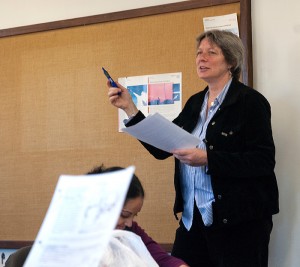
Jane Kerstetter does everything in her power to motivate students during her intensive three-hour long lectures, including bringing a supply of hot coffee and cups to class.
“You have to realize that these students have six straight hours of lectures Monday and Friday, and eight hours of clinical a day Tuesday through Thursday,” says Kerstetter, an associate professor of allied health sciences. “They’re exhausted.”
Kerstetter’s connection to her students and dedication to her craft has earned her a distinction as one of two University Teaching Fellows in the 2009-2010 academic year. The other honoree, Wendy Glenn, is an associate professor and English education coordinator in the Neag School of Education.
Kerstetter’s classes, despite the often intense workload, are popular among undergraduates, who appreciate her commitment and energy. Following a recent Friday afternoon session, students described their professor as “interesting” and “engaging.”
Addressing her classes of future dietitians and health care workers, Kerstetter leads the discussions with marked enthusiasm. She allows her students small breaks at the top of the hour during her longer lectures and then utilizes the time to discuss questions and concerns on the material or current events such as the University’s recent loss of its star football cornerback Jasper Howard.
Laughter seems to play an important role throughout Kerstetter’s lectures as she captures her students’ attention through the use of humorous analogies. In one particular lecture, she compared the thyroid gland’s involvement in specific processes to a gas pedal, emphasizing its usefulness.
Kerstetter encourages students to “watch her,” and not their notebooks, during lectures as she highlights important concepts. Personable and approachable, she makes herself available to students by e-mail for further study sessions or simply to discuss their future careers. Covering complex topics – such as finding the basal metabolic rate in patients of different ages, weights, and activity levels – she speaks slowly and purposefully, giving her students class notes ahead of time and emphasizing what she plans to use in her tests.
“You have to give these kids credit,” Kerstetter says, as the University only accepts a limited amount of students into the dietitian program. After all their hard work, and even in this economy, she adds, “these students will graduate as registered dietitians with great job opportunities” in their fields.
When asked how she felt about becoming a University Teaching Fellow, Kerstetter responded, “Teaching is hard work. It’s easier to get recognition and funding for research, but it’s hard to get recognition as a teacher.”
Preston Britner, an associate professor of human development & family studies, led the Institute for Teaching & Learning’s Advisory Board and Awards Selection Committee that supported Kerstetter’s nomination.
“Professor Kerstetter regards teaching as an art,” Britner says. “She believes that students should have a connection with faculty … Student letters of support describe her teaching style as one that gives students a ‘true thirst for knowledge.’ Another student writes that she ‘transformed complex and intimidating lecture material, making it easier to understand – but without sacrificing the quality of the science.’”
Kerstetter says she encourages constructive criticism from her students so that she can improve her teaching methods and give them an even better learning experience. “Clearly, she has achieved this goal,” says Keith Barker, director of the Institute for Teaching and Learning.
University Teaching Fellows become engaged in a number of teaching and learning activities as part of their recognition. They are asked to participate in workshops developed by the Institute for Teaching & Learning, to allow teaching assistants to visit their classrooms, and to serve as mentors to other faculty in their discipline or cognate areas.
Kerstetter, who began teaching at UConn in 1988, holds a joint appointment with the Department of Nutritional Sciences, which, like allied health, is also in the College of Agriculture and Natural Resources. She is a member of The American Society for Bone and Mineral Research and has been an associate of the American Institute of Nutrition and the American Society for Clinical Nutrition since 1990.


